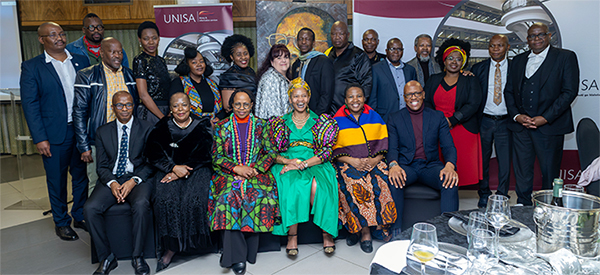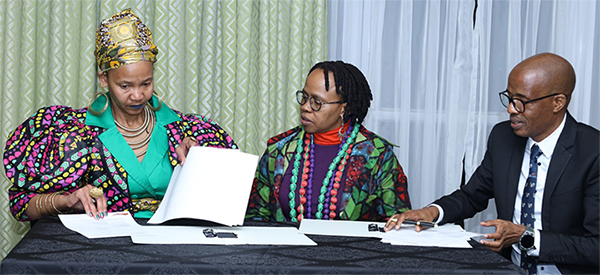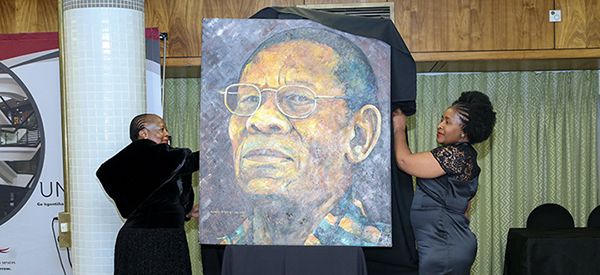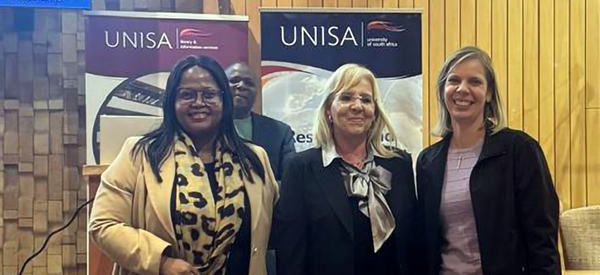
On 23 May 2025, Unisa’s Library and Information Services (LIS) brought its Research and Innovation Week to a resounding close with the official handover and digital launch of the Dr Motsoko Pheko Collection – a monumental archive honouring one of South Africa’s most revered liberation figures and Unisa alumnus. Held under the theme Proudly African Libraries Celebrating Indigenous Knowledge for a Connected World, the evening was both a celebration and a solemn tribute.

Unisa Management alongside collaborators
The programme commenced with an air of vibrancy, led by the dynamic programme director, Dr Thulile Shandu, who brought humour and warmth to the proceedings.
Delivering the welcome address, Prof Thenjiwe Meyiwa, Vice-Principal of Research, Postgraduate Studies, Innovation and Commercialisation, declared the occasion a fitting closure for Research and Innovation Week. She highlighted the digitisation of the Pheko archive as a major milestone in African digital scholarship and the preservation of memory. "This is not just the handing over of documents, but a reclaiming of African dignity. The library is not just a building; it is a living, digitised space of African voices," she affirmed.
Prof Mpho Ngoepe, Executive Director of LIS, offered an evocative reflection that intertwined archival theory, metaphor and personal anecdotes. Emphasising the necessity of inclusive archives that preserve liberation histories often omitted from dominant narratives, he noted, "Dr Pheko was an archivist of memory – not of dust, but of revolution."
The emotional peak of the evening came with the keynote address by Dr Lebohang Pheko, daughter of the late Dr Motsoko Pheko, entitled "Son of the Soil, Voice of the Ancestors". With compelling eloquence, she narrated her father’s journey – from studying in prison to speaking at the United Nations. "This is not just an archive," she declared, "It is a living memory. It is a counter-narrative to historical amnesia."
Pheko praised the Unisa Library for its completion of the digitisation project but also issued a challenge: "Will we only digitise the respectable and the elite, or will we honour those who were inconvenient to power?"

Dr Lebogang Pheko, Prof Thenjiwe Meyiwa and Prof Mpho Ngoepe signing the Deed of Donation
The programme continued with creative reflections, including a powerful poetic tribute evoking themes of heritage, identity and legacy. In his speech, Aphiwe Dlamini, Secretary General of the National Student Representative Council at Unisa, urged unrestricted access for students to utilise the archives. "Take it to the townships and to rural schools – do not lock it behind paywalls," he added.
Reflections from academics, students and activists echoed a resounding message: Dr Pheko’s contributions are not merely to be archived – they must inspire action.
To commemorate the occasion, the Unisa Library unveiled a portrait of Pheko by the artist Dr Daniel Mosako. This expressive piece uses burnt sienna, green, orange and yellow oils to symbolise his connection to land rights, vegetation advocacy and resilience. The brushwork, ranging from bold to translucent, captures the duality of strength and vulnerability that defined his life. This artwork is more than a tribute – it is a timeless artefact that speaks to memory, resistance and African pride, destined to resonate across generations.

Dudu Nkosi and Dr Khomotso Marumo unveiling Dr Motsoko Pheko’s portrait
The event concluded with a poignant reminder, that African libraries are not relics of the past – they are architects of the future.
Earlier in the day, the Unisa LIS hosted a compelling session as part of its Library Research and Innovation Week, highlighting the transformative power of libraries.
The keynote was delivered by Prof Brian Itumeleng Nakedi, Commissioner of the Free State Public Service Commission, who described libraries as cultural strongholds and ethical stewards of memory. He warned against the marginalisation of African worldviews in global knowledge systems and proposed using artificial intelligence to elevate neglected African classics. "Let Chinua Achebe’s Things Fall Apart stand next to Hamlet in digital libraries," he urged.
Apostle Boikanyo Maubane, a visionary leader, offered a theological lens, portraying the Bible as a library of diverse voices and ideologies. "The Bible is widely perceived as a single book, but it is, in fact, a curated collection assembled over centuries." She drew parallels with African libraries, emphasising their role in contextualising knowledge for intergenerational relevance.
As a panellist, Prof Ike Hlongwane from the Department of Information Science stressed the need to digitise oral traditions and include indigenous knowledge holders in the documentation process. "We must not speak of them without them," he asserted, advocating for inclusive, dynamic storytelling through digital platforms and social media.
Otshepeng Moletsane, lecturer at the Department of African Languages, provided a moving personal narrative about researching in his native language. "My language is one of the best in Africa," he proclaimed, critiquing the academic exclusion of African languages and calling for libraries to become spaces of cultural transformation through storytelling and creative engagement.
Erika Janse van Rensburg brought a digital publishing perspective, highlighting growing access to indigenous language journals across Africa. "We must repackage African knowledge in ways that honour its origins while meeting global research standards," she said, underscoring the importance of ethical digital practice.

Boikanyo Maubane, Marita van der Merwe and Erika Janse van Rensburg
A thought-provoking moment came from Dr Vanessa Mathole, lecturer from the Department of Information Science, who questioned the authenticity of language equity in academia: "Are we being honest when we encourage students to write theses in indigenous languages, only to require them to defend those theses in English?" Her comment drew widespread agreement and exposed institutional contradictions.
The session concluded with a unified sense of urgency and possibility. Libraries were framed not only as repositories of knowledge but as catalysts for transformation, cultural affirmation and global relevance. As moderator Dr Janice de Wee aptly summarised: "We are not just storing data; we are safeguarding memory and reclaiming our right to be heard on the world stage."
*By Itumeleng Mpete, Marketing Coordinator, Library and Information Services
Publish date: 2025-06-03 00:00:00.0